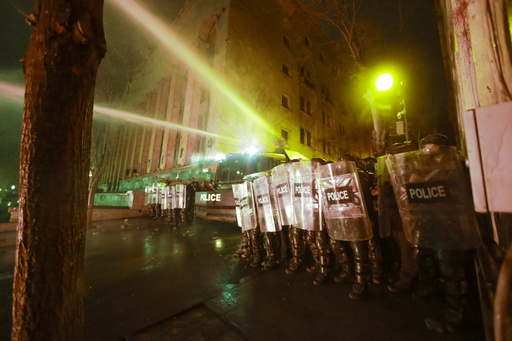
In Tbilisi, Georgia, thousands of protesters gathered once more outside the parliament on Tuesday, expressing their frustration over the ruling party’s recent decision to halt negotiations aimed at joining the European Union.
Last week, demonstrators faced off against riot police over several nights; officers used water cannons and tear gas to break up the crowds, while protesters retaliated by hurling fireworks and constructing barricades on the city’s main boulevard. Reports indicate that nearly 300 individuals were apprehended, and twenty-six people, including three law enforcement officers, required hospitalization due to injuries sustained during the confrontations.
Tamar Kordzaia, an opposition figure from the Unity National Movement, captured the prevailing sentiment, stating, “The more force they use, the angrier people become, because everyone they arrest has relatives, and everyone understands that this is injustice.” She expressed optimism that the protests would lead to new elections and a renewed push for EU accession, noting signs of fatigue among police personnel. “I am sure we need to withstand a little longer,” she added.
The ruling Georgian Dream party maintained its position in parliament following the contentious parliamentary election held on October 26, which many viewed as a referendum on Georgia’s aspirations to join the EU. The opposition and the pro-Western president have alleged that the election was rigged with assistance from Russia, leading to a boycott of parliamentary sessions.
The backlash against the government intensified after the announcement to suspend EU accession discussions, igniting renewed protests. Rusudan Chanturia, a participant in the demonstration, asserted, “We are fighting for our democracy, to protect human rights, human dignity.” Fellow protester David Jandieri emphasized the need for the demonstrations to persist until their objectives are fulfilled, stating, “In fact, we do not have another choice.”
According to reports from Georgia’s Interior Ministry, as of Tuesday, 293 protestors were detained on administrative charges, while five faced criminal charges. The President of Georgia, Salome Zourabichvili, has publicly rejected the legitimacy of the election results and is contesting them in the Constitutional Court, which dismissed her appeal on Tuesday. Despite her largely ceremonial role, she announced her intention to continue advocating for a new parliamentary election even after her term concludes later this month.
In December 2023, the EU granted Georgia candidate status, contingent on the country meeting specific recommendations. However, in June, the bloc suspended its accession process and reduced financial aid due to the introduction of a controversial “foreign influence” law that many criticized as an infringement on democratic freedoms. This law mandates organizations receiving over 20% of their funding from abroad to register as entities “pursuing the interest of a foreign power,” mirroring a similar statute in Russia that undermines groups critical of the government.
The decision to suspend the EU talks came swiftly after the European Parliament introduced a resolution denouncing the October election as neither free nor fair. On Monday, the EU reiterated its “serious concerns about the continuous democratic backsliding of the country.”
In response to the mounting unrest, Prime Minister Irakli Kobakhidze of the Georgian Dream party claimed that the government remains open to resuming EU accession negotiations, should the EU cease what he termed “blackmail.” “I want to remind European bureaucrats and politicians, including those who are artificially hindering our country’s European integration,” he stated, expressing readiness to sign agreements immediately should negotiations restart.
